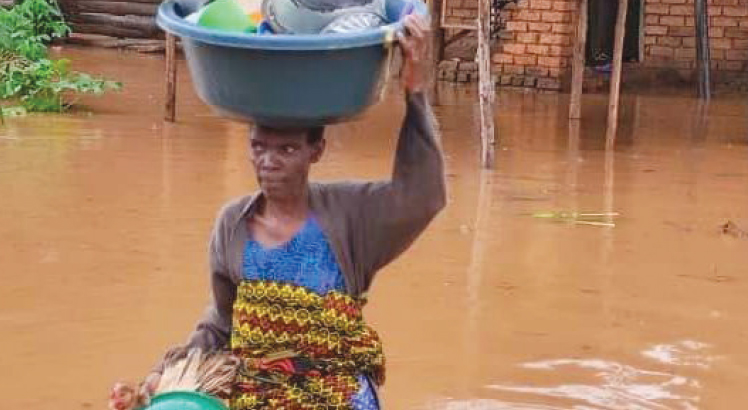Experts call for action to avert global warming
World’s leading climate scientists under the Inter-Governmental Panel on Climate Change (IPCC) have urged Malawi and other countries to act fast in preventing global warming.
In a report released on Tuesday, the governments are asked to do more in mitigating climate change effects or risk more natural disasters.
In part, the report advises that limiting global warming to 1.5 degrees Celsius would, among other things, reduce water related risks across regions and sectors.

during floods in March this year
“Projected increases in hydrological extremes pose increasing risks, with a potential doubling of flooding risk between 1.5-3 degrees Celsius of warming and an estimated 120-400 percent increase in population at risk of river flooding at 2-4 degrees Celsius respectively,” the report warns.
The report also projects increased losses to gross domestic product (GDP) due to flooding.
Additionally, it indicates that while climate change directly affects freshwater availability, it also affects water requirements for different uses including irrigation.
“Vulnerability to water-related impacts of climate change and extreme weather are already felt in major sectors such as agriculture, energy, and industry; as well as water for health and sanitation among others, and are projected to intensify in the future,” reads the report in part.
Civil Society Network on Climate Change national coordinator Julius Ng’oma backed the need for immediate action.
He said: “If we do not take any action now, there will be more damage with the impending cyclones.
“The IPCC report has indicated that soon, we will have more cyclones with higher intensity and frequency and a lot of damage will be caused. If we do not take care of the environment, we should expect more damage.”
Ng’oma highlighted the need to conserve forests and the existing water resources considering the depletion of water resources and even animals, as well as the reckless cutting down of trees; all of which confirm the extent of degradation in Malawi.
“We need to come up with programmes to help us to manage some of the remaining forests and to rejuvenate others; and manage other natural resources as well,” he said.
Nonetheless, Ng’oma noted that the country has done quite a lot in environmental management by coming up with the right policies, legislative frameworks and strategies.
Another environmentalist Dorothy Nhlema was pleased that Malawi is addressing deforestation to mitigate climate change effects.
She said: “I commend government and other stakeholders for developing various policy frameworks to guide implementation of initiatives, including annual tree planting season; two million clean cook stoves and modern cooking for healthy forests among others.
“Government has also signed various regional and international agreements on its commitment to address deforestation, including the Bonn Challenge where we committed to plant five million hectares with trees; the Paris agreement and others.”
Both environmentalists said the citizenry must respect the laws and participate in conservation efforts, including tree planting, replanting and management.
“If we all take part, our forests will grow within the shortest time, and all these climate change effects will be a thing of the past,” Nhlema said.
IPCC was created to provide policymakers with regular scientific assessments on climate change, its implications and potential future risks.





